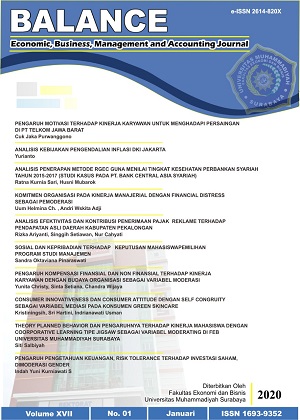Theory Planned Behavior Dan Pengaruhnya Terhadap Kinerja Mahasiswa Dengan Coorporative Learning Tipe Jigsaw Sebagai Variabel Moderating Di FEB Universitas Muhammadiyah Surabaya
DOI:
https://doi.org/10.30651/blc.v17i1.4187Abstrak
The Theory of Planning Behavior Research (TPB) has a significant role in the performance of students with Jigsaw Cooperative Learning as a moderating variable. In this study, Cooperative Learning Type Jigsaw was chosen as moderating the relationship between Planned Behavior Theory (TPB) and student acquisition. The population used was 313 third semester students of management and accounting study program of FEB UM Surabaya. The sampling technique used is the Issac and Michael Tables to determine the sample size of 147 respondents. The analysis technique used is a Moderated Regression Analysis (MRA) analysis tool. The results of this research show (1) The Theory of Planned Behavior (TPB) does not significantly influence student performance, (2) Jigsaw Cooperative Learning does not moderate the effect of the Planned Behavior Theory (TPB) on student performance.
Â
Kata kunci     :Theory Planned Behavior, Cooperative Learning Tipe Jigsaw, kinerja mahasiswaReferensi
Ajzen, Icek. (1988). Attitudes personality, and behavior. Milton Keynes: Open University Press dan Chicago, IL: Dorsey Press.
-------- (1991). The Theory of Planned Behavior: Organizational Behavior and Human Decision Processes. University of Massachusetts at Amherst. 50:179- 211.
--------- (2005). Attitude Personality and Behavior. New York. USA: Open University Press.
Ajzen, I., (2006). Constructing a TPB Questionnaire: Conceptual and Methodological Considerations. [Online] Available at: http://www.people.umass.edu[Accessed 2 7 2015].
Aronson sponsors a website with important information about his methods at http://www.jigsaw.org/
Corsini, Ray. (2002). The Dictionary of Psychology. London: Brunner/Rout Ledge.
Cruz, L, Suprapti., & Yasa., 2015. E- Jurnal Ekonomi dan Bisnis. Aplikasi Theory Of Planned Behavior Dalam Membangkitkan Niat Berwirausaha Bagi Mahasiswa Fakultas Ekonomi UNPAZ. DILI Timor Leste.
Fishbein, M., & Ajzen, I,, 1975. Belief, Attitude, Intention, and Behavior: An Introduction to Theory and Research, Reading. MA: Addison-Wesley.
Ghozali, I. 2005. Aplikasi Analisis Multivariat Dengan Program SPSS. Universitas Dipenogoro. Semarang.
Ghozali, I. 2013. Aplikasi Analisis Multivariat Dengan Program SPSS. Universitas Dipenogoro. Semarang.
Grid, A., & J, J, Bagraim., 2008. South African Journal of Psychology. The Theory Of Planned Behavior as Predictor of Entrepreneurial Intentamongst Final-year University Student.
https://idthesis.com/teori-lengkap-tentang-theory-planned-behavior-tpb.
Ismal, V, Y., & Zain, E., 2008. Peranan Sikap, Norma Subjektif, dan Perceived Behavior Control terhadap Intensi Pelajar SLTA untuk Memilih Fakultas Ekonomi. Jurnal Ekonomi dan Bisnis Vol. 5 No. 3, Desember 08.
Yuliana. (2004). Pengaruh Sikap pada Pindah Kerja, Norma Subjektif, Perceived Behavioral Control pada Intensi Pindah Kerja pada Pekerja Tehnologi Informasi. Phronesis: Jurnal Ilmiah Psikologi Terapan 6, 1-18.
Kosasih., Natalia., dan Sri Budiani., 2007. Pengaruh Knowledge Management Terhadap Kinerja Karyawan: Studi Kasus Departemen Front Office Surabaya Plaza Hotel. Jurnal Manajemen Perhotelan. Vol. 3. No. 2 pp 80-88.
Li, Wei. 2006. Entrepreneurial Intention Among International Student: Testing a model of entrepreneural intention. Journal University of Illinois at Urbana - Champaign, 217- 721- 9969.
Lie A. 2010. Cooperative Learning. Jakarta: Penerbit Grasindo.
Lumpkin, A., 2007. Caring teachers the key to student learning. Kappa Delta Pi Record. Vol. 43, Issue 4, pp. 158-160















